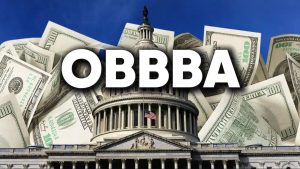
On July 4, 2025, the President signed into effect H.R.1. The One Big Beautiful Bill Act contains major changes that will impact taxation for 2025 and beyond for different types of taxpayers. Richard Tullier, Jr, CPA provides this tax summary of the One Big Beautiful Act. Included below are some key points regarding the tax policy changes, for individuals and for businesses:
SUMMARY OF INDIVIDUAL PROVISIONS (effective for tax years beginning 2026, unless otherwise stated):
- Tax brackets will remain in place as assigned with the 2017 tax law
- Larger Standard Deduction is made permanent and indexed for inflation
- Senior deduction of $6,000 per individual for those over age 65 with Adjusted Gross Income (“AGI”) limitations of $75,000 for Single filers and $150,000 for Married Filing Jointly (“MFJ”) filers; Applicable for 2025 – 2028
- Deduction on Tips earned by those in qualifying businesses (restaurants, food service, salons, etc.) allowed up to $25,000 if AGI does not exceed certain thresholds; Applicable for 2025 – 2028
- Deduction on Overtime for time paid in excess of the ordinary pay rate for a non-exempt individual allowed up to $12,500 for Single and HOH filers and $25,000 for MFJ Filers with AGI limits; Applicable for 2025 – 2028
- Qualified Business Income deduction phaseouts increased and a new minimum deduction introduced
- Car Loan Interest deductible up to $10,000 for personal vehicles purchased from 2025 – 2028
- Charitable contributions are allowed up to $2,000 for MFJ; $1,000 for others without itemizing
- Contributions to Dependent Care FSAs increased to $7,500
- Itemized deductions:
- Deduction for state and local taxes is capped at $40,000 with income phaseouts down to $10,000 (January 1, 2025)
- Mortgage Insurance Premiums are again deductible
- Miscellaneous Itemized Deductions gone permanently, but a new deduction is available for educators
- New Limitation on Itemized Deductions for those in the highest tax bracket
- Gambling Losses only deductible up to 90%, still cannot exceed Gambling Winnings
- Casualty Losses are only allowed for federal or state declared disasters
- Charitable contributions for Itemized Deductions are allowed only if the aggregate exceeds 5% of AGI
- Tax Credit Impacts
- Child Tax Credit increased to $2,200 and indexed for inflation (January 1, 2025)
- Childcare Tax Credit increased to 50% of the amount paid with AGI phaseouts but not below 20%
- Credit for Contributions to Scholarship Granting Organizations up to $1,700
- Credits removed:
- Section 25E – Previously Owned Clean Vehicle Credit
- Section 30D – Clean Vehicle Credit
- Section 30C -Alternative Fuel Vehicle Refueling Property Credit (June 30, 2026)
- Section 25C – Energy Efficient Home Improvement Credit (December 31, 2025)
- Section 25D – Residential Clean Energy Credit (December 31, 2025)
- Estate and Gift Tax Exclusion set at $15 million for 2026
- TRUMP accounts established as IRA equivalent account for individuals under the age of 18 with an annual contribution limit of $5,000 and subject to specific investment requirements
- Additional uses available for 529 plans including elementary and secondary public or private school as well as state and federal licensing programs (Effective for distributions after July 4, 2025}
- Qualified Opportunity Zones are made permanent, and gain may be deferred up to 5 years with a 10% exclusion if held the entire time
- Qualified Small Business Stock (Sec 1202) benefits enhanced effective July 4, 2025
SUMMARY OF BUSINESS PROVISIONS (effective for tax years beginning 2026, unless stated otherwise}:
- Bonus depreciation set to 100% for purchases after January 19, 2025
- New category for bonus depreciation for non-residential manufacturing property
- Certain requirements must be met regarding first use by taxpayer
- Construction must begin after January 19, 2025 and before January 1, 2029
- Lessors are not eligible
- Restrictions apply on which portion of the building qualifies
- Section 179 base deduction increased to $2.5 million with a property limit of $4 million (Effective for Tax Years beginning after December 31, 2024}
- Business Interest Limitation now includes addbacks for depreciation and amortization (Effective for Tax Years beginning after December 31, 2024}
- Corporate charitable contributions must exceed 1% of taxable income
- Beauty Services Businesses now eligible for Employer Tip Credit (Effective for Tax Years beginning after December 31, 2024}
- Research & Development expenditures now fully deductible (Effective for Tax Years beginning after December 31, 2024}:
- Qualified small businesses may be allowed to amend prior year returns from 2022 forward to claim amounts previously amortized
- All businesses are eligible to elect immediate deduction in 2025 tax year
- Tax Credit Impacts
- Research & Development credit applicable only to domestic expenditures
- New Markets Tax Credit made permanent
- Credits removed:
- Section 45W – Qualified Commercial Clean Vehicles Credit (September 30, 2025)
- Section 30C – Alternative Fuel Vehicle Refueling Property Credit (June 30, 2026)
- Section 179D – Energy Efficient Commercial Buildings Deduction (June 30, 2026)
- Section 45L – Energy Efficient Home Credit for developers (June 30, 2026)
- Section 45V – Clean Hydrogen Production Credit (January 1, 2028)
- Section 45X – Advanced Manufacturing Production Credit (December 31, 2033)
- Section 48E – Clean Electricity Investment Credit (December 31, 2027)
- Additional reporting requirements necessary to comply with Tip and Overtime Reporting
- New 1099 reporting requirements increased to payments greater than $2,000 (up from $600)
- Employee Retention Tax Credit claims filed after January 31, 2024 will not be honored
The One Big Beautiful Bill Act contains major changes that will impact taxation for 2025 and beyond for different types of taxpayers, as this summary shows. While this list is not all inclusive, we believe it contains the major items addressed with the new legislation. As always, Wegmann Dazet CPAs are available to help you determine how best to use this information to guide you through this change and into the future. Please contact us if you have any questions.
- A Tax Summary of the One Big Beautiful Bill Act - July 30, 2025
- Entity Choice and Tax Planning - August 29, 2023
- EMPLOYEE RETENTION CREDITS – That offer might not contain the full story - June 5, 2023
